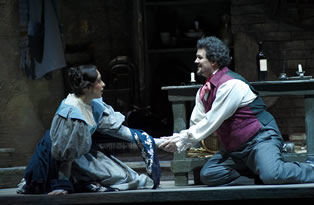La Boheme: a naturalistic delivery

A young cast gives new life to Giacomo Puccini’s La Boheme. This production by The Canadian Opera Company charmed audiences if not critics at the opening April 17 at the Four Seasons Centre for the Performing Arts.
Director Maer Gronsdal Powell and lighting designer Stephen Ross shoot for understated realism. No special effects or grandiose characters sweep the stage – just a handful of artists, portrayed with controlled naturalism as they try to survive in 1830s Paris. Unfortunately, other aspects of the staging don’t match this down-to-earth vision and realism itself doesn’t fit into Puccini’s melodrama with its the ups and downs – love-at-first-sight, lovers’ quarrels, looming death and slapstick comedy in between.
Sets and costumes recycled from Wolfram and Amrei Skalicki’s 70’s productions clash with Powell’s down-to-earth direction. Although vintage sets often work well and save budget on lavish productions, on this occasion they undermine the direction. The prop-strewn garret in acts one and five seems a bit much for penniless artists. The lavish gazebo set of Cafe Momus warrants its 20-minute set-up time but when the curtain falls after only 18 minutes of show time, momentum dissipates. Complete with unicyclists, pickpockets and whores, the stage is almost too full for the audience to find the main characters. But this is nothing to the awkward blocking that has Rudolfo competing with Mimi’s sleeves as they embrace in the final act. Antiquated balloon sleeves make a nice image on this curvy icon of docility, but when they obscure the face of an anguished lover . . . it’s time to re-block.
Conductor Julian Kovatchev faithful conveys Puccini’s rich score to support the fresh cast. Backed by assistant conductor Derek Bate, he trusts delicate notes, pulsing cadences and swelling arpeggios to woo the audience. In a mostly Canadian company, even supporting characters get a gold star for energetic performances backed by COC-quality skill. Both graduates of the COC ensemble, Robert Gleadow and Jon-Paul Décosse deliver solid vocals, laughs and a sense of brotherhood in the supporting roles of Colline and Schaunard.
Tenor David Pomeroy brings COC Ensemble experience to the leading role of the poet, Rudolfo. He makes up for a lack of depth in his sound with graceful cadences and a smooth upper register. His passion dwarfs soprano Frédérique Vézina’s restrained performance as his lover, the ailing seamstress Mimi. When their hands touch on a pregnant a flat in act one, he awakens with desire — she seems merely surprised. But her voice soon wins us. It is full without false grandeur, controlled but free with a wide dynamic range. Unfortunately, the actress does not deliver the drama required of a tragic heroine. Even in Rudolfo’s kisses, she expresses nothing more than surrender. If anyone cries at her death, it’s for Rudolfo’s anguished cries, not for her.
A welcome contrast brightens act two, supporting soprano Anna Leese. In her debut performance with the COC, the New Zealander dazzles as Muzetta, the flirty lover of Rudolfo’s friend, Marcello. The chemistry between her and Canadian baritone Peter Barrett as the painter makes the central affair look like your grandparents – the dead ones. With a round, resonant sound and lyrical performance, Barrett holds his own beside a fiery Leese.
The first three notes of Muzetta’s famous aria “Quando m’en vo” reveal a sound so refined and pristine, it’s almost at odds with the raw desire Leese emanates in her movements and expression. While random pantomime artists dance on the steps beside her, the audience has eyes only for Muzetta . . . a fact Powell would’ve done well to accommodate. Although she’s usually sidelined, Leese delivers the most stunning performance of the show. In fact, she probably sings the most beautiful line, warming Mimi’s wasted hands in notes of pained depth in the final scene.
Despite some hiccoughs, the COC’s latest production delivers what we expect of La Boheme — laughs, tears and young love.
La Boheme by Giacomo Puccini, produced by the Canadian Opera Company, Conductor: Julian Kovatchev/ Derek Bate; Director: Maer Gronsdal Powell; Set Designer: Wolfram Skalicki; Mimì: Frédérique Vézina; Rodolfo: David Pomeroy; Musetta: Anna Leese; Marcello: Peter Barrett; it continues at the Four Seasons Centre, Toronto; for more information go here.



